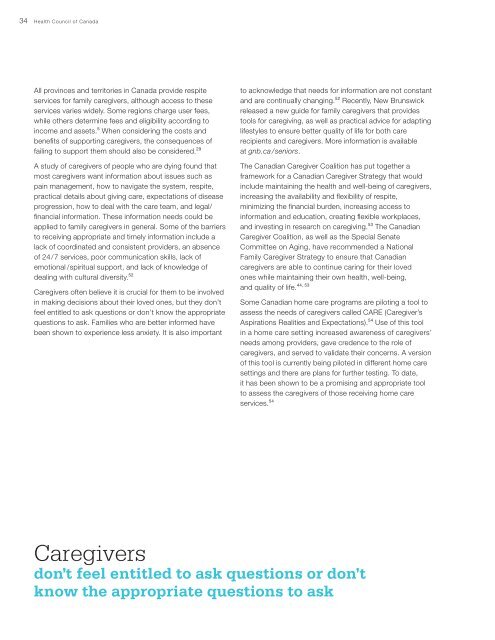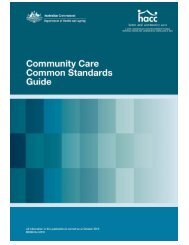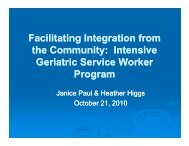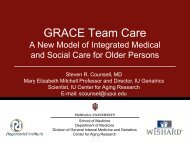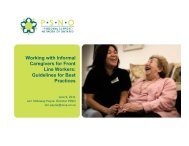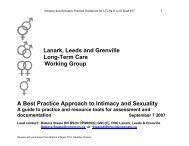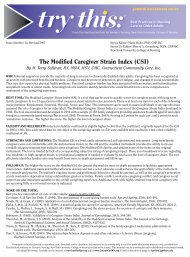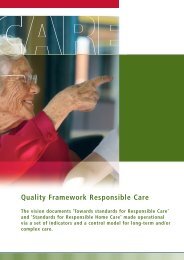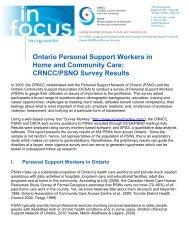Seniors in need, caregivers in distress:
Seniors in need, caregivers in distress:
Seniors in need, caregivers in distress:
Create successful ePaper yourself
Turn your PDF publications into a flip-book with our unique Google optimized e-Paper software.
34 Health Council of Canada<br />
All prov<strong>in</strong>ces and territories <strong>in</strong> Canada provide respite<br />
services for family <strong>caregivers</strong>, although access to these<br />
services varies widely. Some regions charge user fees,<br />
while others determ<strong>in</strong>e fees and eligibility accord<strong>in</strong>g to<br />
<strong>in</strong>come and assets. 5 When consider<strong>in</strong>g the costs and<br />
benefits of support<strong>in</strong>g <strong>caregivers</strong>, the consequences of<br />
fail<strong>in</strong>g to support them should also be considered. 29<br />
A study of <strong>caregivers</strong> of people who are dy<strong>in</strong>g found that<br />
most <strong>caregivers</strong> want <strong>in</strong>formation about issues such as<br />
pa<strong>in</strong> management, how to navigate the system, respite,<br />
practical details about giv<strong>in</strong>g care, expectations of disease<br />
progression, how to deal with the care team, and legal/<br />
f<strong>in</strong>ancial <strong>in</strong>formation. These <strong>in</strong>formation <strong>need</strong>s could be<br />
applied to family <strong>caregivers</strong> <strong>in</strong> general. Some of the barriers<br />
to receiv<strong>in</strong>g appropriate and timely <strong>in</strong>formation <strong>in</strong>clude a<br />
lack of coord<strong>in</strong>ated and consistent providers, an absence<br />
of 24/7 services, poor communication skills, lack of<br />
emotional /spiritual support, and lack of knowledge of<br />
deal<strong>in</strong>g with cultural diversity. 52<br />
Caregivers often believe it is crucial for them to be <strong>in</strong>volved<br />
<strong>in</strong> mak<strong>in</strong>g decisions about their loved ones, but they don’t<br />
feel entitled to ask questions or don’t know the appropriate<br />
questions to ask. Families who are better <strong>in</strong>formed have<br />
been shown to experience less anxiety. It is also important<br />
to acknowledge that <strong>need</strong>s for <strong>in</strong>formation are not constant<br />
and are cont<strong>in</strong>ually chang<strong>in</strong>g. 52 Recently, New Brunswick<br />
released a new guide for family <strong>caregivers</strong> that provides<br />
tools for caregiv<strong>in</strong>g, as well as practical advice for adapt<strong>in</strong>g<br />
lifestyles to ensure better quality of life for both care<br />
recipients and <strong>caregivers</strong>. More <strong>in</strong>formation is available<br />
at gnb.ca /seniors.<br />
The Canadian Caregiver Coalition has put together a<br />
framework for a Canadian Caregiver Strategy that would<br />
<strong>in</strong>clude ma<strong>in</strong>ta<strong>in</strong><strong>in</strong>g the health and well-be<strong>in</strong>g of <strong>caregivers</strong>,<br />
<strong>in</strong>creas<strong>in</strong>g the availability and flexibility of respite,<br />
m<strong>in</strong>imiz<strong>in</strong>g the f<strong>in</strong>ancial burden, <strong>in</strong>creas<strong>in</strong>g access to<br />
<strong>in</strong>formation and education, creat<strong>in</strong>g flexible workplaces,<br />
and <strong>in</strong>vest<strong>in</strong>g <strong>in</strong> research on caregiv<strong>in</strong>g. 53 The Canadian<br />
Caregiver Coalition, as well as the Special Senate<br />
Committee on Ag<strong>in</strong>g, have recommended a National<br />
Family Caregiver Strategy to ensure that Canadian<br />
<strong>caregivers</strong> are able to cont<strong>in</strong>ue car<strong>in</strong>g for their loved<br />
ones while ma<strong>in</strong>ta<strong>in</strong><strong>in</strong>g their own health, well-be<strong>in</strong>g,<br />
44, 53<br />
and quality of life.<br />
Some Canadian home care programs are pilot<strong>in</strong>g a tool to<br />
assess the <strong>need</strong>s of <strong>caregivers</strong> called CARE (Caregiver’s<br />
Aspirations Realities and Expectations). 54 Use of this tool<br />
<strong>in</strong> a home care sett<strong>in</strong>g <strong>in</strong>creased awareness of <strong>caregivers</strong>’<br />
<strong>need</strong>s among providers, gave credence to the role of<br />
<strong>caregivers</strong>, and served to validate their concerns. A version<br />
of this tool is currently be<strong>in</strong>g piloted <strong>in</strong> different home care<br />
sett<strong>in</strong>gs and there are plans for further test<strong>in</strong>g. To date,<br />
it has been shown to be a promis<strong>in</strong>g and appropriate tool<br />
to assess the <strong>caregivers</strong> of those receiv<strong>in</strong>g home care<br />
services. 54<br />
Caregivers<br />
don’t feel entitled to ask questions or don’t<br />
know the appropriate questions to ask


